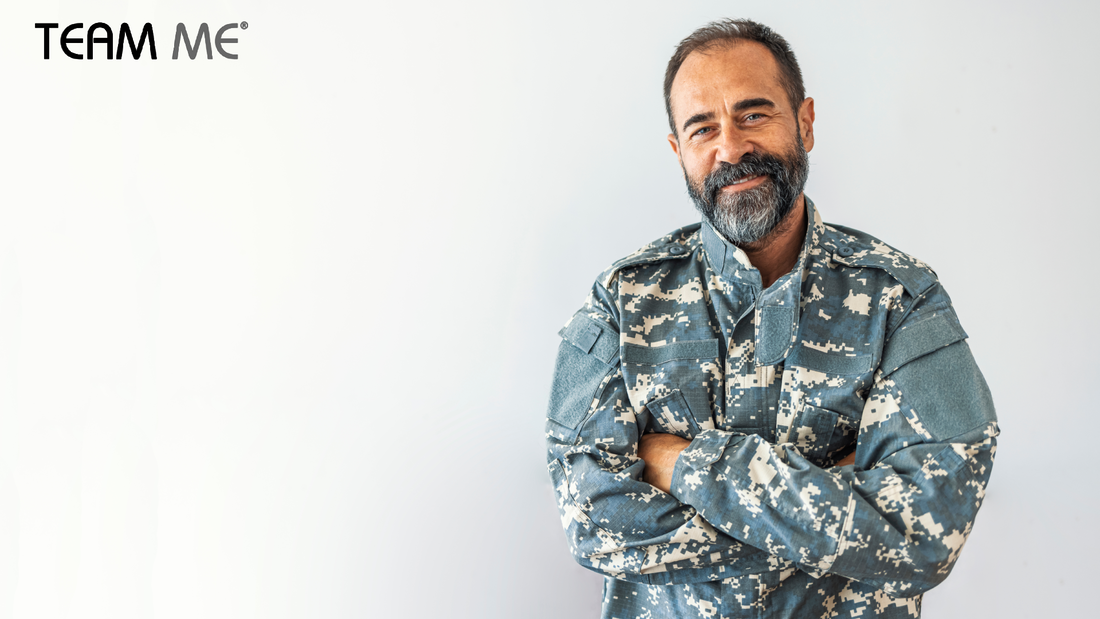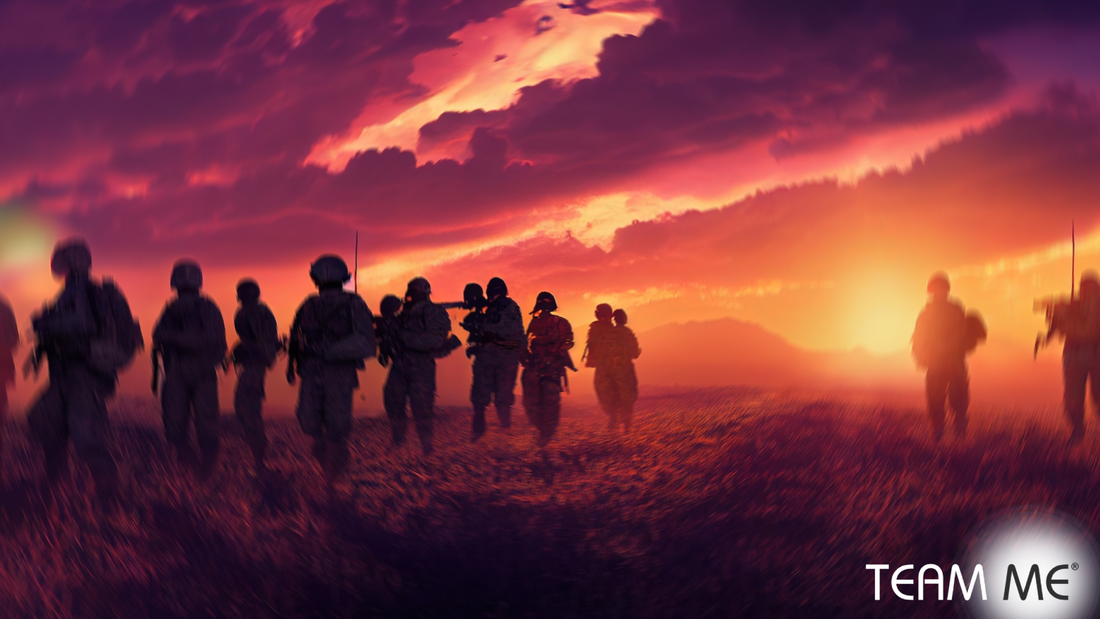.The transition from military service to civilian life is a profound and challenging phase for veterans. Having spent years in a structured and disciplined environment, service members develop a unique sense of identity that is deeply shaped by their experiences in the armed forces. As they step into civilian life, these veterans face a critical need to establish a new sense of personal identity, reconciling their past with their future. Understanding the factors that have moulded their identity during their military tenure, and addressing the significant adjustments required for civilian life, are essential for their successful reintegration into society. This article builds upon the two previous articles entitled: The Veterans Quest #1 - The Hidden Battle of Veterans in Transition and The Veterans Quest #2 - Transition and the Perceived Loss of Purpose, that laid a foundational understanding of the plight of veterans as they traverse the, often bumpy, period of transition into civilian life. “I know it sounds absurd, but please tell me Who I Am.” - Supertramp. Military IDAn individual’s sense of identity is enormously shaped by what is demanded of them in their life situation. From before we were born our environment has nurtured us in countless ways to mould us into who we have become today. During the course of our lives, a significant and permanent shift in our environment can cause us to experience a deep sense of uncertainty that has us questioning who we really are. Losing a sense of identity in this way can be extremely mentally and emotionally destabilising, and can lead to a host of psychological challenges. The solution would be to find a pathway, for it is in all truth and ongoing journey, to rediscover a core sense of identity that defines us for who we really are, whatever environment we find ourselves in. Identity exists on multiple levels and for this kind of discovery we need to go deep enough to discover what is fundamental to our personal and unique design. While there’s no room here for a full-scale thesis, it’s worth us breaking down this brief overview into 3 critical areas:
Let’s explore each in turn. Factors Shaping Identity in the Military1. Camaraderie and Brotherhood: Serving in the military fosters strong bonds with fellow service members. Soldiers often develop a profound sense of camaraderie and brotherhood, relying on one another in challenging and life-threatening situations. This close-knit connection becomes a defining aspect of their identity and social support. 2. Purpose and Mission: Military personnel are driven by a sense of purpose and mission larger than themselves. The dedication to protecting their nation and fellow citizens instils a deep sense of pride and identity linked to their role in the armed forces. 3. Discipline and Structure: The military's rigid structure and discipline permeate every aspect of a service member's life. This sense of order and routine becomes ingrained in their identity, shaping their behaviours and decision-making process. 4. Specialised Skills and Training: Service veterans often acquire unique skills and expertise during their time in the military that are really only of use in a military setting. These abilities contribute to their identity as people around them value them for these skills (e.g. bomb-disposal). Of course, it may pose a challenge to such a skilled individual when no one in civilian life knows or cares about these abilities. 5. Adversity and Resilience: Military life exposes individuals to significant adversity and challenges. Overcoming these hardships builds resilience and fortitude, traits that help to define their identity and may influence how they approach civilian life's obstacles. But who are you when your enemy is vanquished? We all need to find our still centre - that sense of who we are when there’s nothing to resist, nothing to demand our core skills. The Challenges and Demands of Adjusting to Civilian Life1. Loss of Camaraderie: Leaving the close-knit military community can lead to a profound sense of loss and isolation. Veterans may struggle to find similar support networks and friendships, leading to feelings of detachment. 2. Redefining Purpose: Transitioning veterans often encounter a void in their lives when their military mission concludes. They must redefine their sense of purpose and find new avenues to contribute to society. 3. Reintegrating into Civilian Society: The military's structured environment contrasts with the more fluid nature of civilian life. Veterans may find it challenging to adapt to the lack of hierarchy and clear-cut chain of command. They’re free to make so many decisions for themselves now, self-guided choices that they had little opportunity to practise in the past. 4. Dealing with Trauma: Many service members carry emotional and psychological scars from their experiences, such as combat trauma or the loss of comrades. Coping with these traumas is critical for establishing a new and healthy civilian identity. 5. Bridging the Skills Gap: While veterans possess valuable skills, translating them into civilian job qualifications can be challenging. They might need to undergo additional training or education to match the requirements of their desired careers. 6. Facing Misunderstanding and Stereotypes: Civilian society may hold misconceptions about military life and veterans, leading to potential stigma and prejudice. Overcoming these stereotypes is vital for building a positive civilian identity. Establishing a New Sense of Identity1. Seek Support: Connecting with other veterans, joining support groups, or seeking counselling can help navigate the challenges of transitioning into civilian life and foster a new sense of camaraderie. 2. Embrace Individuality: Veterans should recognize that their identity extends beyond their military service. Exploring personal interests, hobbies, and passions will aid in forming a unique civilian identity. 3. Set New Goals: Establishing new short-term and long-term goals will provide a sense of purpose and direction, giving veterans a renewed sense of motivation. 4. Emphasise Transferable Skills: Identifying and highlighting transferable skills acquired during military service will boost confidence and make them more marketable in the civilian job market. 5. Educate and Advocate: Engaging with civilian communities to share experiences and educate them about military life can help dispel stereotypes and foster understanding. The Forward MarchThe journey of transitioning from military service to civilian life is a transformative and often very challenging experience for veterans. Establishing a new sense of personal identity is a complex process that requires introspection, support, and a willingness to embrace change, but it is absolutely vital if a solid foundation is to be established from which the veteran can build their new life outside the institutional structures they’ve formerly been used to.
Challenging though it is, by acknowledging the factors that shaped their identity in the military and addressing the adjustments needed to succeed in civilian life, veterans can effectively integrate into society and find fulfilment beyond their years of service to their nation. As a society, it is our responsibility to recognise the importance of this transition and support our service veterans as they embark on this path of rediscovery and renewal. At TEAM ME® we're exploring new ways to elevate the self-respect, self-worth, self-awareness and self-empowerment of veterans in the UK and around the world. If you are actively involved in supporting veterans at scale, feel free to get in touch to see how our rapid Personality Profiling solution could help you in your own quest to elevate the lives of those who have served - and still have so much more to give. Many military veterans in transition find themselves facing a very real sense of purposelessness in their civilian work and new life situation. Leaving the forces and entering civilian life presents any individual with a significant culture shock, one that they should prepare themselves for, and navigate with full conscious awareness of the dynamics and pressures that will inevitably impact them. What we can say however is that the causes of the psychological challenges that those in transition regularly face are easy to identify and are actually rather obvious when brought to the surface. Remedying these matters may not be a simple task, we should hastily add, but in recognising them for what they are we can define a clear direction of focus for any individual seeking better ways to navigate these uncertainties. Four vital areas that we need to understand include the following: 1. Ambiguity and Lack of Structure: Transitioning veterans may initially find civilian life to be ambiguous and lacking the structured environment they are accustomed to. This absence of a clear-cut mission can lead to a perceived loss of purpose. 2. Reconciling Service and Civilian Roles: Finding ways to transfer their sense of service and commitment from military roles to civilian professions can be challenging, especially when facing professions that may not appear as directly impactful. 3. Navigating Identity Shifts: As veterans separate from the military, their identity can undergo significant changes. They may struggle to reconcile their former roles and experiences with the person they are becoming in the civilian world. 4. Missing Camaraderie: The strong bonds formed during military service can be challenging to replicate in civilian life. The absence of a close-knit unit can lead to feelings of isolation and disconnection from a shared sense of purpose. Face-offAddressing these matters is a mission in itself. It takes time to understand the enemy, to respect their strengths, and combat their potentially destructive influence in the veterans’ life. Let’s focus on four significant counter-measures that can help any veteran reclaim their sense of purpose and develop strategies for a successful transition. 1. Reflection and Goal-Setting: Veterans should take time to reflect on their values, passions, and long-term aspirations. Setting new goals aligned with these aspects can reignite a sense of purpose in civilian life. 2. Embrace Transferable Skills: Identifying the skills acquired during military service and understanding how they can be applied in civilian settings can offer a renewed sense of purpose and confidence. 3. Engage in Community Service: Participating in community service or volunteering can provide veterans with an opportunity to continue serving and making a positive impact in their new communities. 4. Seek Mentorship and Support: Engaging with fellow veterans who have successfully transitioned can provide valuable insights and support during this journey. 5. Pursue Education and Personal Growth: Lifelong learning and personal development can lead to new interests and passions, expanding the scope of potential purpose in civilian life. Into ActionThe transition from military service to civilian life presents a unique opportunity for veterans to rediscover their sense of purpose. As purpose is deeply woven into the fabric of military life, the journey of transitioning may seem daunting, with veterans facing challenges in adapting to a new environment that may initially appear void of such purpose.
By understanding the intrinsic connection between purpose and military life, however, and empathising with the struggles of personnel in transition, we can collectively support our veterans in their quest to reclaim and redefine their sense of purpose. Through reflection, engagement, and personal growth, transitioning veterans can embark on a fulfilling and purpose-driven journey in civilian life, continuing to make a positive impact in their communities and beyond. At TEAM ME® we're exploring new ways to elevate the self-respect, self-worth, self-awareness and self-empowerment of veterans in the UK and around the world. If you are actively involved in supporting veterans at scale, feel free to get in touch to see how our rapid Personality Profiling solution could help you in your own quest to elevate the lives of those who have served - and still have so much more to give. |
AuthorPad is a trusted adviser to business leaders across the globe. He is Director at Come Alive Success Coaching ltd. and the Author of TEAM ME - How to Play Your Best Game in Life, and TEAM GUY - Forging Men of Soul & Steel. Archives
August 2023
Categories
All
|




 RSS Feed
RSS Feed